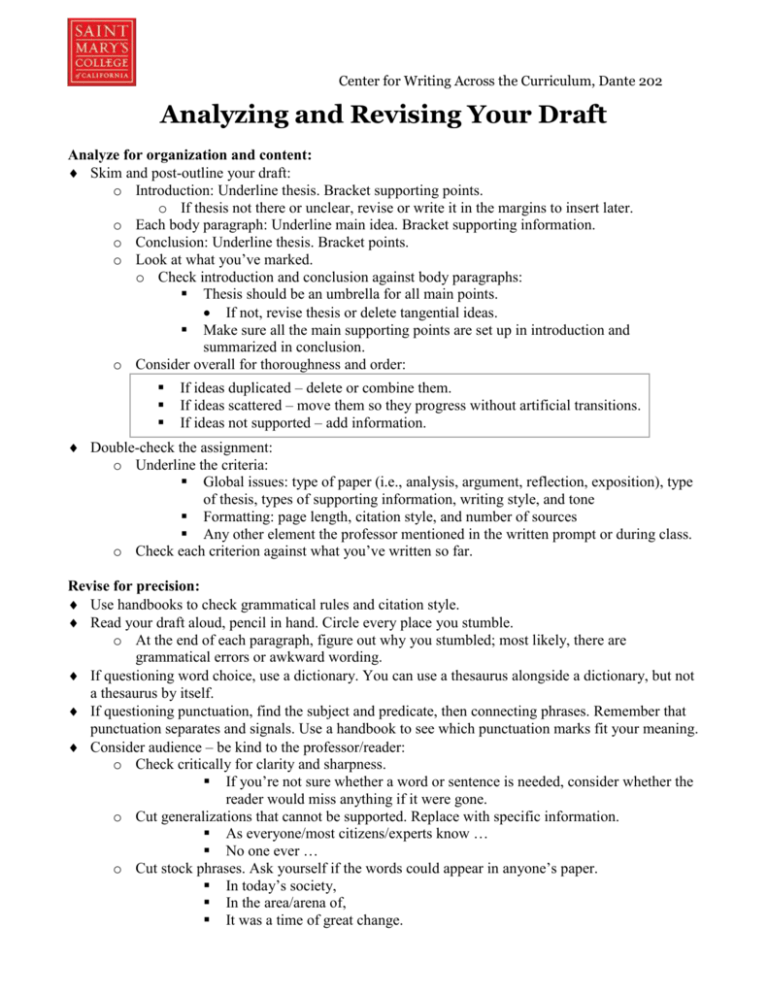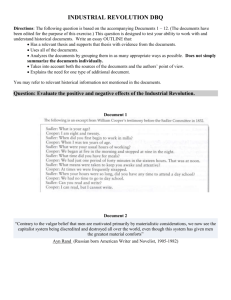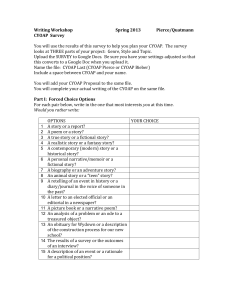Analyzing and Revising Your Draft
advertisement

Center for Writing Across the Curriculum, Dante 202 Analyzing and Revising Your Draft Analyze for organization and content: Skim and post-outline your draft: o Introduction: Underline thesis. Bracket supporting points. o If thesis not there or unclear, revise or write it in the margins to insert later. o Each body paragraph: Underline main idea. Bracket supporting information. o Conclusion: Underline thesis. Bracket points. o Look at what you’ve marked. o Check introduction and conclusion against body paragraphs: Thesis should be an umbrella for all main points. If not, revise thesis or delete tangential ideas. Make sure all the main supporting points are set up in introduction and summarized in conclusion. o Consider overall for thoroughness and order: If ideas duplicated – delete or combine them. If ideas scattered – move them so they progress without artificial transitions. If ideas not supported – add information. Double-check the assignment: o Underline the criteria: Global issues: type of paper (i.e., analysis, argument, reflection, exposition), type of thesis, types of supporting information, writing style, and tone Formatting: page length, citation style, and number of sources Any other element the professor mentioned in the written prompt or during class. o Check each criterion against what you’ve written so far. Revise for precision: Use handbooks to check grammatical rules and citation style. Read your draft aloud, pencil in hand. Circle every place you stumble. o At the end of each paragraph, figure out why you stumbled; most likely, there are grammatical errors or awkward wording. If questioning word choice, use a dictionary. You can use a thesaurus alongside a dictionary, but not a thesaurus by itself. If questioning punctuation, find the subject and predicate, then connecting phrases. Remember that punctuation separates and signals. Use a handbook to see which punctuation marks fit your meaning. Consider audience – be kind to the professor/reader: o Check critically for clarity and sharpness. If you’re not sure whether a word or sentence is needed, consider whether the reader would miss anything if it were gone. o Cut generalizations that cannot be supported. Replace with specific information. As everyone/most citizens/experts know … No one ever … o Cut stock phrases. Ask yourself if the words could appear in anyone’s paper. In today’s society, In the area/arena of, It was a time of great change. Keep a list of issues that tend to come up in your writing. o After you think you’re done, go back over your draft looking for each issue, separately. For instance, if pronouns are problematic, as they often are, read through your draft noting only pronouns and which nouns they refer to.









